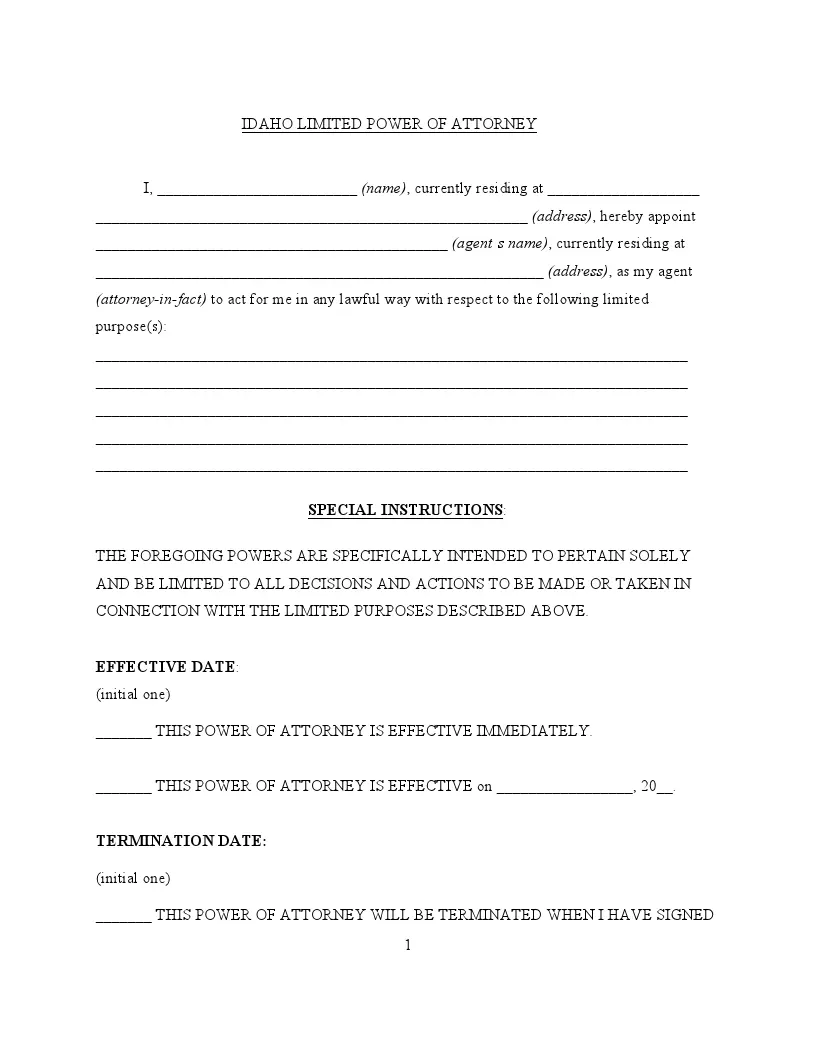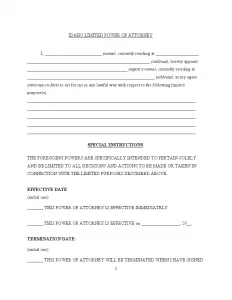Idaho Limited Power of Attorney Form
An Idaho limited power of attorney is a legal form that allows an individual (referred to as the “principal”) to designate another person (called the “agent” or “attorney-in-fact”) to perform specific tasks on their behalf. This form is “limited” because it restricts the agent’s powers to specific activities or events.
In Idaho, as in other states, this document is commonly used for tasks the principal cannot attend to personally. This might include handling real estate transactions, managing financial accounts, or making decisions about personal property. The form must specify what powers are being granted and under what circumstances.
For a limited power of attorney to be effective in Idaho, it must comply with state laws. Additionally, the form must be drafted clearly to avoid ambiguity about the agent’s authority.
Get all the Idaho power of attorney templates available — click to view and complete the forms.

Build Your Document
Answer a few simple questions to make your document in minutes
Save and Print
Save progress and finish on any device, download and print anytime
Sign and Use
Your valid, lawyer-approved document is ready
In Idaho, establishing a limited power of attorney is guided by Title 15, Chapter 12 of the Idaho Statutes, part of the Uniform Power of Attorney Act. This legislation details how you can designate an agent to act on your behalf for specific duties, ensuring all legal formalities are met to create an enforceable document. Key legal requirements include:
- Defined broadly in § 15-12-102(7), a power of attorney in Idaho includes any writing that grants an agent the authority to represent the principal, regardless of terminology.
- The principal’s signature must be notarized, as stated in § 15-12-105 of the Idaho Statutes. This requirement is essential to authenticate the signature and protect against fraud.
The power of attorney document is considered valid if it adheres to the formalities of notarization, confirming the principal’s identity and voluntary sign-off. This adherence to statutory requirements ensures that the document is legally sound, allowing the agent to perform only those actions explicitly outlined by the principal in the agreement (§ 15-12-201). The clear delimitation of these powers helps prevent misuse of the granted authority and aligns the agent’s actions with the principal’s intentions.
Idaho Limited Power of Attorney Form Details
| Document Name | Idaho Limited Power of Attorney Form |
| Other Name | Idaho Special Power of Attorney |
| Relevant Laws | Idaho Statutes, Section 15-12-201 |
| Avg. Time to Fill Out | 8 minutes |
| # of Fillable Fields | 32 |
| Available Formats | Adobe PDF |
Filling Out Idaho Limited POA
Filling out a limited power of attorney in Idaho allows you to designate someone to handle specific tasks on your behalf. Below is a step-by-step guide on properly filling out this form to ensure it’s legally valid and reflects your intentions.
1. Identify Yourself as the Principal
Start by providing your full legal name and complete address where indicated. This identifies you as the principal, the person granting the power to another.
2. Designate Your Agent
In the specified space, write the full name of the person you are designating as your agent (also known as the attorney-in-fact). This individual will receive the authority to act on your behalf according to the powers you specify.
3. Detail the Authorized Powers
List the specific powers you grant to your agent in the provided spaces. Be as detailed as possible to clarify what the agent is allowed and not allowed to do. It could include selling property, managing bank accounts, or handling business transactions.
4. Define the Duration
Indicate the duration for which this power of attorney will remain effective. If it’s until a specific date, mention it here. Otherwise, it will remain in effect until you provide a written revocation.
5. Appoint a Successor Attorney-in-Fact
If your first choice for an agent is unable or unwilling to serve, you can designate an alternate agent. Fill in the name and address of the successor attorney-in-fact.
6. Sign and Date the Form
Sign the form and write the date to validate the document. This should be done in the presence of a notary public.
7. Complete the Notarization
Have the form notarized to certify your identity as the principal and the authenticity of your signature. The notary will fill out the state and county, verify your identity, and affix their seal on the document.
8. Distribute Copies Accordingly
Provide a copy of the notarized form to your agent and keep the original in a safe place. It’s also advisable to give copies to institutions or individuals that might require it, such as banks or legal entities involved in the matters you’ve entrusted to your agent.
